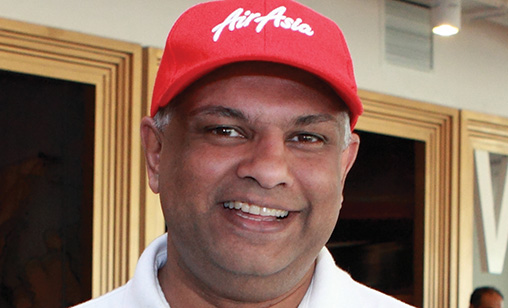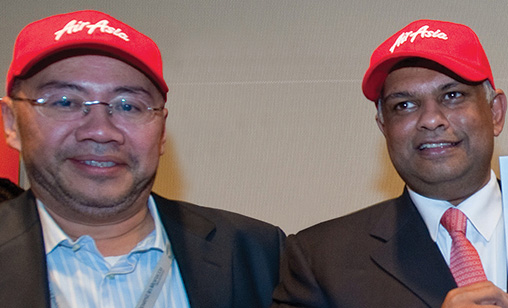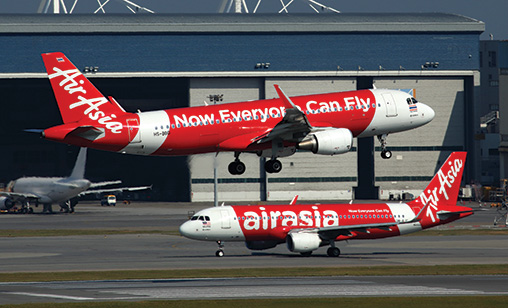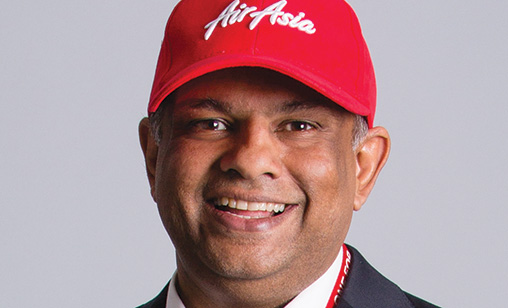Cover Story
Back in the driving seat
It has been a bumpy ride at the AirAsia Group in the last two years. Profits nose-dived, the share price slumped and most of its subsidiaries lost money. But in 2016 the group is back in the black and its charismatic group chief executive, Tony Fernandes, is determined to keep it there. He spoke to chief correspondent, Tom Ballantyne.
May 1st 2016
AirAsia Group CEO, Tony Fernandes, is not one to make excuses about anything, including his own missteps. He quickly conceded to Orient Aviation last month that there was a lot of truth in suggestions by some critics that his large portfolio of non-airline businesses meant he had taken his eye off the ball at the low-cost carrier group. Read More »
 |
| 'The stock market will go up and down. Analysts can say what they want. The best way to shut them up is actually to perform. I’ve said little, apart from my belief that the AirAsia Group is very valuable. It has motivated me tremendously to put my nose to the wheel and let the results speak for themselves' |
| Tony Fernandes AirAsia Group CEO |
Along with AirAsia and its regional subsidiaries, he was running the leisure and entertainment company, Tune Group, which Fernandes co-founded with Kamarudin Meranun. He also launched the Caterham Formula 1 motor racing team, now sold after a bitter ending, and took majority ownership of English soccer club, Queens Park Rangers. These huge investments crowded his business agenda and the aviation industry noticed.
“Yes, there is truth in the fact that I had more on than AirAsia, but it was clear we had a role to go out and do other things,” Fernandes said. “I have built AirAsia with Kamarudin and we thought it was time to start handing over.
“We brought in other people and I started dabbling in a few other things. But I have scaled back a lot, having decided AirAsia can do with me for a few more years. As long as I am aboard and see the usefulness of us being around, we will carry on.”
There is, however, a lot more to Fernandes’ commitment than a verbal declaration of backing for the airline group. In April, he and his long-time partner announced they would spend $260 million to buy 559 million new shares in the AirAsia Group. The purchase will raise their direct and indirect holdings in the region’s largest budget carrier group from 18.9% to 32.4%.
The airline group will use the funds injection to reduce debt, pay for aircraft purchases, construct a new headquarters at Kuala Lumpur International Airport and provide working capital going forward.
For the AirAsia Group it was proof that Fernandes was totally behind it and was staying put. It also signaled that privatization, rumoured to be on the cards, definitely was off the agenda, at least for now.
The group had needed cash. A $1 billion multi-currency medium-term note program, announced early this year, was abandoned because the cost of funding was too high, said Fernandes.
“Kamarudin and I decided: lets show confidence to the group. We did this by one, demonstrating we will be around for a while and will put our money where our mouth is. And two making it clear to all how deeply we believe that the AirAsia Group is quite special,” he said.
“AirAsia is our baby. We have been hurt by the lack of confidence shown in us by analysts and shareholders. We thought we would kill two birds with one stone: raise the money needed for the AirAsia Group and show our long-term commitment to the company.”
The announcement was a huge shot in the arm for the entire Kuala Lumpur headquartered conglomerate. It was still recovering from a period of losses in a fiercely competitive budget carrier market, a situation not helped by the tragic crash of Indonesia AirAsia flight 8501 on December 28, 2014.
 |
| 'Yes, there is truth to the fact that I had more on than AirAsia, but also it was clear we had a role to go out and do some other things. I have built AirAsia with Kamarudin and we thought it was time to start handing over' |
| Tony Fernandes AirAsia Group CEO |
In its latest results, for the fourth quarter to December 31, the group’s net profit was $142.6 million, compared with a loss of $110.4 million in the same period a year ago. For full-year 2015, AirAsia Group’s net profit grew more than six-fold, to $139.3 million, from a meagre $21.3 million a year earlier. Revenue was up 16.3%, to $1.6 billion. Fernandes said the “outlook remains positive”.
Results at affiliates in Thailand, the Philippines, Indonesia and India have been mixed. Thai AirAsia is in the black and is forecast to double its profits this year. It posted a net profit of $42.1 million for the first nine months of 2015, compared with a loss of $13 million for the same period in 2014.
But AirAsia’s joint ventures in the Philippines and Indonesia and in India, which is virtually in its start-up phase, remain in the red. Nevertheless, Fernandes is pleased with their progress. “We see from the first quarter results, ending March 31 and not yet released, that things are tracking very well,” he said.
“There will be bumps along the way in the next two years, but I am sure the Philippines and Indonesia have the potential to be like AirAsia Thailand in the not-too-distant future.”
Also on the horizon is the launch of AirAsia Japan, which Fernandes said is likely to be in October. “We’ve have received the Air Operators Permit and are doing the regulatory clearances. We are on track for an October launch,” he said.
AirAsia’s Indian joint venture subsidiary has another problem apart from fierce competition. Local rivals claim the carrier is run from Kuala Lumpur and not India. A similar objection was successfully argued by carriers in Hong Kong when Qantas’s attempt to set up Jetstar Hong Kong was rejected by the territory’s aviation regulator.
The debate about AirAsia India’s modus operandi has become so heated that AirAsia has issued a statement that insisted the airline’s majority ownership and effective control were in the hands of Indian parties and conformed to regulations.
“All the important decisions concerning the day-to-day operations of the airline are taken by the management team of the airline under the overall supervision, control and direction of the board of directors (which includes a majority of Indian nationals),” the statement said.
Fernandes, who has strong Indian roots, said AirAsia India is “a phenomenal case” of incumbents doing their best to stop him. “Instead, they have made us the peoples’ hero for fighting the incumbents. Our brand [there] is very large,” he said.
| Fernandes is a Mueller admirer At home in Kuala Lumpur he also welcomes the recovery of Malaysia Airlines (MAB), now edging back into profit after its serious flirtation with bankruptcy. “I feel that there is a chief executive there (Christoph Mueller) who’s very focused on cost. This is always a good thing. I’d rather a stronger MAB than a weak MAB that has to be propped up by the government. I think it is good Christoph comes with no baggage and no emotionality and is a good businessman focused on his job and is happy to work with us. We’ve always been open to co-operation for the betterment of the industry. A healthy industry is good for everyone.” At press time, Mueller announced he would resign as MAB CEO in September “for personal reasons” but will remain at the airline as a non-executive board director. |
“We have put in a new management team and are more and more confident about the future of AirAsia India.
“Clearly, the TATAs have increased their shareholding -the Indian conglomerate bought an additional 7.94% equity that lifted its stake to 49% - that makes us very comfortable about what is being done. So I continue to be optimistic about India.
“The country has a billion people. I believe we can do in India what we have done in Southeast Asia. We are up to eight aircraft and well on the path to profitability. Consistent profitability will come to us when we reach a reasonable size, which I believe will be in 2017 or 2018.”
Another development that hit the headlines recently was his application to be an Overseas Citizen of India (OCI), which detractors claimed was intended to circumvent Indian airline ownership rules.
“Absolutely not the case,” Fernandes said. “It has nothing to do with AAI (AirAsia India). I didn’t apply for OCI for anything to do with AAI. It has zero bearing whether I am an OCI or whatever.
 |
“I applied because my dad would have been proud. I applied because I want to spend more time in India and as an OCI I don’t need a visa. And I can buy houses. So that was another bonus.”
There is one other issue that clearly rankles with him – the negative reports about the AirAsia Group that were circulated by some analysts in the past year, particularly GMT Research. The Hong Kong-based company claimed the carrier boosted its bottom line with lease and maintenance deals between the parent group and its associates. AirAsia Group always has denied doing so, but the report has been blamed for a significant drop in the group’s share price.
How frustrating has it been? “I have been very consistent,” Fernandes said. “The stock market will go up and down. Analysts can say what they want. The best way to shut them up is to perform. I’ve said little, apart from my belief that the AirAsia Group is very valuable. It has motivated me tremendously to put my nose to the wheel and let the results speak for themselves.”
AirAsia [group] is a pioneer, he said. “People benefit from what we have done. As a pioneer you are going to set the standards, but also be bound to scrutiny. There were no low-cost carriers of any significant size before AirAsia. There were no joint ventures in the Asian airline business until we came along. That invokes jealousy. It invokes issues and a new set of problems,” he said
One of those issues is the process of investing in the consolidation of the AirAsia Group, which is made difficult because of the different regulations and ownership rules in various countries. “We are still struggling with that process. It’s less than clear. We’ve done a lot, but we have been hammered for that. We have tried to be as transparent as possible.”
Fernandes said with consolidation so much attention is given to each component country. “You know Ryanair is not asked how is Ryanair Poland or Ryanair Hungary doing. It’s because it’s Europe. It’s one airline,” he said.
“If we were doing one airline you would just look at the bottom line, but because of the way we have to account for ourselves in different countries it’s fragmented and hence you have all these unnecessary questions.”
 |
| 'If ASEAN doesn’t get it together we are going to be marginalized by China and India. As an economics student - I’m not a very good economics student – I understand economic co-operation is a real benefit' |
| Tony Fernandes AirAsia Group CEO |
Some affiliates remained unprofitable, he said, but they still contributed to the group as a whole. “AirAsia India contributes immensely to the AirAsia Group. Its flights from Thailand and Malaysia are doing phenomenally well due to our brand having such big prominence, probably for the wrong reasons, but that is thanks to our competitors,” he said.
“India, the Philippines and Indonesia as individual countries are not making much money or making money as we would like, but as a group they are contributing phenomenally to the Group’s operating profits.”
On the wider stage, there is one subject where Fernandes has been very vocal: the need for ASEAN (Association of Southeast Asian Nations) countries to work together.
“If ASEAN doesn’t get it together then we are going to be marginalized by China and India. As an economics student - I’m not a very good economics student - economic co-operation is a real benefit.”
Lots of progress has been made with ASEAN open skies, with most countries having ratified it, although some barriers remain, he said. “I am very optimistic. I am hoping this forms the framework for an ASEAN aviation authority and an ASEAN form of Eurocontrol (Europe’s overall air traffic management system) so we have more efficiency. We have to persuade governments they are not going to lose sovereignty,” he said.
After playing a prominent role in the formation of the Association of Malaysian Air Carriers (AMAC) last month, an initiative sparked by the Malaysian government’s plans to dramatically increase air service charges, he hoped an ASEAN airline association could come into being soon.
He would like to see a consensus reached with ASEAN that would allow some measures to be introduced in the region even if there was not unanimous agreement among the ten members. Visa rules are one example. “If eight countries agree, go ahead with it. That is better than nothing. You sit on the doorstep of India and China yet in some cases those people have to get five or six visas to travel round ASEAN,” he said.
Operationally, the AirAsia Group is expanding after a period of slowed growth that included deferral of some aircraft deliveries. At last December 31, AirAsia and its affiliates were operating 188 A320-200s. On order are 41 A320-200s and 300 A320neos, with many of them destined for fleet replacement.
“We are not looking at more orders, but there are some interesting developments coming along. Certainly, if all the associates start firing then we are short of planes. We are definitely short of planes. When we do it, how we do it, we’ll just wait and see,” he said.
Fernandes is not concerned about possible over-capacity, given the large orders placed by LCCs around the region. He said Indonesia’s Lion Air and AirAsia itself are the only two budget carriers with really large aircraft orders in place.
“From our standpoint, we cut back dramatically and have been adding capacity in the single figures. We’ll restart to grow. I don’t see any other airline doing stupid orders. We are small given the population Asia has and Europe has far more aircraft than the 700 operating in ASEAN,” he said.
| ASEAN ambitions AirAsia Group boss, Tony Fernandes has his eye on more affiliates. His dream would be to have AirAsia clones in every ASEAN country, but at some stage he would probably look at adding two, with Vietnam a particular target. “We need to capture more opportunities in ASEAN. We are in six countries and would like to add a couple more. It is nice to have an airline in all parts of ASEAN, say Cambodia, Myanmar, Vietnam, Brunei and Laos. China also is a big market for us. It is a dream, but let us now deliver what we have,’’ he said. |
The long-haul arm, AirAsia X, which recently launched to Auckland via the Gold Coast in Australia, is to re-launch to London, a route it terminated along with Paris in 2012. Fernandes said the return is “imminent” and negotiations are underway with UK airports.
It will finally allow him to make his European trips aboard his own heavy metal. Since AirAsia X withdrew from London, he has mainly flown with Singapore Airlines and thinks he has probably been one of its best customers between Singapore and London. “The crew is always fantastic and treat me really well. They surprised me with a birthday cake and a card on one flight.”
Now operating 20 A330-300s, AirAsia X has 55 A330-900neos on order, with deliveries from 2018, and 10 A350-900s that will begin to arrive at the airline later this year.
But above all, it is his AirAsia Group employees that get Fernandes out of bed in the morning. He is in awe of the job they have done, and continue to do, despite the huge obstacles they have faced. “I look at KLIA2 (Kuala Lumpur International Airport 2) and see the number of places we fly to and how people are happy. We have made the world a smaller place. The other great thing that may be under-reported a little bit is that we have broken down discrimination with females and female pilots,” he said.
“I know there are lots of stories, but we set the blaze. We have created pilots from dispatch boys and created chief executives from cabin crew. It’s been a great story. We reached 300 million passengers last August. My hair stands on end. It was not so long ago that we had just two planes.”
In fact, the original airline was launched in 1993 by a government-owned conglomerate and was heavily in debt when Fernandes and Kamarudin bought it for RM1 (around 25 US cents) in 2001.
So how long will he stick around? “I have always said I’m not going to be here forever and I don’t think I should be. I’m not a leader who wants to create a dynasty,” he said.
But you can be sure of one thing. He will be there as long as it takes to prove to his detractors wrong about the AirAsia Group and its longevity.